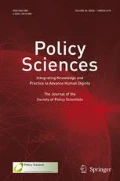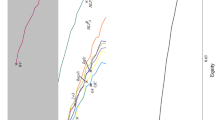Abstract
Mutual distrust between experts and ordinary citizens—manifest in the wake of the Brexit referendum, the rise of the Tea Party and the election of Donald Trump—is not new. But it takes on particular urgency in an age when ill-informed “populist” policies on issues such as climate change may cause irreparable damage. This article examines the viability of Gilley’s (Policy Sci 50:9–22, 2017) attempt to resolve the conflict between “technocracy” and democracy. Gilley’s solution relies on the objective qualities of a policy to assign it to its appropriate “sphere”: Highly technical problems are best addressed by experts, while those marked by technical uncertainty can be handled by democracy. This article argues that such a solution will not be stable under current political conditions. We must recognize that various forms of corruption of expertise have contributed to today’s populist reaction against experts. The challenge of reforming expertise and mitigating mistrust of experts is a “divergent” problem, which requires ongoing balancing, and does not admit of a once-and-for-all solution.
Similar content being viewed by others
Notes
Throughout this paper, “corrupt” is a broader concept than “illegal.” In the case of expertise, a useful working definition can draw on the traditional criterion of publicness: An act is corrupt if, were it publicly known, it would legitimately diminish the authority of the actor (see Kant rpt. 1991, 126).
One might believe, for example, that the distributional benefits of a minimum wage increase outweigh employment or efficiency considerations. Or one might view the issue as a matter of basic justice: “Why should someone work full time, year-round, and not make enough to pay for rent and other basics?” (Ehrenreich 2017).
Pat Michaels, for example, received money from: Western fuels, the German Coal Mining Association, Edison Electric, and Cyprus minerals, all of which came to light only when he was put under oath (Gelbspan 1997, 41).
This helps explain the influence of global warming skeptics. As George Monbiot notes, “people listen to this nonsense because the alternative is to accept what no one wants to believe” (2004).
Adam Smith’s analysis of university governance offered a cautionary observation on the limits of collective self-regulation: “If the authority to which he is subject resides in the body corporate, the college, or university, of which he himself is a member, and in which the greater part of the other members are, like himself, persons who either are, or ought to be teachers, they are likely to make a common cause, to be all very indulgent to one another, and every man to consent that his neighbour may neglect his duty, provided he himself is allowed to neglect his own” (rpt. 1937, 718).
The argument here is certainly not that policy analysis should be “value-free.” The point is rather that, as Robert Dahl put it, “the clandestine smuggling of moral values into the social sciences” should be replaced by “open and honest commerce” (1947, 1–2). A corollary of this is that value claims, as much as empirical ones, should be subject to rigorous scrutiny.
When citizens do strike back, we cannot reasonably expect them to demonstrate laser-like precision in their choice of targets. They will respond to cues from those political leaders who they believe are (finally) talking to them. In both the Brexit referendum and the Trump election, anger at economic marginalization was linked to xenophobia. (In both cases, of course, many voters were moved by other considerations.).
As Lewandowsky et al note with regard to climate debates, “Appeals to uncertainty are so pervasive in political and lobbying circles that they have attracted scholarly attention under the name ‘scientific certainty argumentation methods’, or ‘SCAMs’ for short” (2015, 2).
Schumacher credits G. N. M. Tyrrell for the concepts. But Schumacher’s use of them is far more fruitful, and has much more significance for the policy world, than Tyrrell’s own (e.g. 1952).
References
American Economic Association. (2012). AEA disclosure policy. https://www.aeaweb.org/journals/policies/disclosure-policy.
Caplan, B. (2006). The myth of the rational voter. Princeton: Princeton University Press.
Dahl, R. (1947). The science of public administration: Three problems. Public Administration Review, 7, 1–11.
Davenport, C., & Lipton, E. (2017). How G.O.P. leaders came to view climate change as fake science. New York Times, 3 June.
Ehrenreich, B. (2017). New kinds of work require new ideas—and new ways of organizing. New York Times, 23 February.
Funk, C., & Kennedy, B. (2016). Public opinion about genetically modified foods and trust in scientists connected with these foods. Pew Research Center (1 December). http://www.pewinternet.org/2016/12/01/public-opinion-about-genetically-modified-foods-and-trust-in-scientists-connected-with-these-foods/.
Gelbspan, R. (1997). The heat is on. Reading, Massachusetts: Addison-Wesley.
Gilley, B. (2017). Technocracy and democracy as spheres of justice in public policy. Policy Sciences, 50, 9–22.
Haidt, J. (2012). The righteous mind. New York: Random House.
Hamilton, A., Jay, J., & Madison, J. (1937). The Federalist. New York: Modern Library.
Harris, G., & Berenson, A. (2005). Ten voters on panel backing pain pills had industry ties. New York Times, 25 February.
Ibsen, H. (1999). An enemy of the people. Mineola, NY: Dover.
Kaiser, D., & Wasserman, L. (2016). The Rockefeller family fund versus Exxon. New York Review of Books, 8 December.
Kant, I. (1991). Appendix to perpetual peace. In H. Reiss (Ed.), Kant: Political writings (2nd ed.). Cambridge: Cambridge University Press.
Krimsky, S., & Schwab, T. (2017). Conflicts of interest among committee members in the National Academies’ genetically engineered crop study. Public library of science, 28 February. https://doi.org/10.1371/journal.pone.0172317.
Lewandowsky, S., et al. (2015). Uncertainty as knowledge. Philosophical Transactions of the Royal Society A, 373, 20140462.
Lipton, E., Confessore, N., & Williams, B. (2016). Think tank scholar or corporate consultant? It depends on the day. New York Times, 8 August.
Monbiot, G. (2004). Goodbye, kind world. Guardian weekly, 20 August.
Pew Research Center. (2015). Public and scientists’ views on science and society. Washington: Pew Research Center. http://assets.pewresearch.org/wp-content/uploads/sites/14/2015/01/PI_ScienceandSociety_Report_012915.pdf.
Popper, K. (2002). The logic of scientific discovery. London: Routledge.
Schumacher, E. F. (1974). Small is beautiful. London: Abacus.
Smith, A. (1937). The wealth of nations. New York: Modern Library.
Tyrrell, G. N. M. (1952). Man the maker: A study of man’s mental evolution. New York: E.P. Dutton.
U.S. House. (2009). Committee on Energy and Commerce. Preparing for climate change: Adaptation policies and programs: Hearing before the subcommittee on energy and environment. 111th Congress, 1st session, 25 March.
Walzer, M. (1983). Spheres of justice. New York: Basic Books.
Wilson, W. (1987). The study of administration. In J. Shafritz & J. Ott (Eds.), Classics of public administration (2nd ed.). Chicago: The Dorsey Press.
Author information
Authors and Affiliations
Corresponding author
Rights and permissions
About this article
Cite this article
Ryan, P. “Technocracy,” democracy … and corruption and trust. Policy Sci 51, 131–139 (2018). https://doi.org/10.1007/s11077-017-9305-1
Published:
Issue Date:
DOI: https://doi.org/10.1007/s11077-017-9305-1




